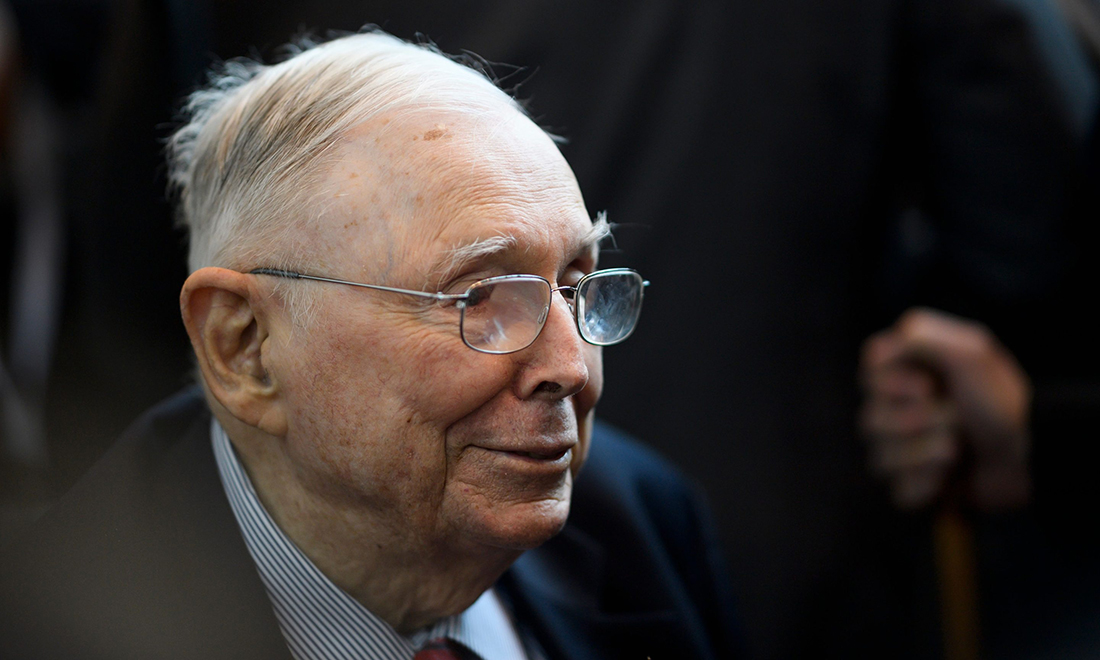 伯克希爾-哈撒韋董事會副主席查理·芒格去世,享年99歲。圖片來源:JOHANNES EISELE/GETTY
伯克希爾-哈撒韋董事會副主席查理·芒格去世,享年99歲。圖片來源:JOHANNES EISELE/GETTY億萬富翁沃倫·巴菲特的得力干將查理·芒格于當?shù)貢r間11月28日去世,享年99歲。
芒格是一位名副其實、具有傳奇色彩的投資家,因其機智、幽默以及在事業(yè)方面的果決而著稱。他是控股公司伯克希爾-哈撒韋董事會副主席,自1975年以來一直與巴菲特共事,并在這一過程中成為了億萬富翁。
盡管芒格不像巴菲特那樣為公眾所熟知,但他備受投資界和金融媒體的尊敬。Business Insider網(wǎng)站稱,多年來,他捐獻了自己的大部分財產(chǎn),包括將超過75%伯克希爾公司的股票捐贈給Planned Parenthood和斯坦福大學(Stanford University)這些機構(gòu)(最近,又向加州圣馬力諾亨廷頓圖書館進行了捐贈)。不過,根據(jù)《福布斯》(Forbes)的數(shù)據(jù),他當前的凈資產(chǎn)約為26億美元。
芒格在2013年對《奧馬哈世界先驅(qū)報》(Omaha World-Herald)說:“我在刻意地減少自己的凈資產(chǎn)。我覺得,自己總有一天要離開人世……屆時我要去的地方也用不了這些。”
他給巴菲特提供的最知名建議就是,別再總盯著去抄底了。畢竟,與其買十幾只業(yè)績平平公司的股票,不如購買三只有著不錯業(yè)績的公司的股票。巴菲特稱贊芒格改變了其投資理念,并塑造了伯克希爾-哈撒韋當前的經(jīng)營方式。巴菲特稱芒格曾經(jīng)告訴他:“別再想著以便宜的價格買入那些平庸的企業(yè),而是要以合理的價格買入優(yōu)秀的企業(yè)。”
芒格在過去數(shù)年中為普通投資者提供了大量的智慧箴言。
他在伯克希爾-哈撒韋5月召開的股東年會上表示:“道理很簡單,要量入為出,要精明地投資,不要接觸那些有害的人和活動,并在一生中盡力保持學習。如果上述事情都能做到,那么人們獲得成功基本上就是十拿九穩(wěn)的事情。如果做不到,要成功的話就得靠大量運氣了。”
芒格非常鄙視投機性投資,稱其是一種癮癥,對國家有害。對于投資而言,他熱衷于在購買后長期持有,并提倡要耐心對待任何投資。
巴菲特還稱贊了芒格所說的另一句話:“我唯一想知道的就是自己會在哪里去世,這樣我永遠都不會去那個地方。”實際上,這句話鼓勵人們要始終思考長遠影響,并分析行動,以避免隱形陷阱。芒格也曾說過一句很有意思的話:“要發(fā)現(xiàn)那些聰明人主要會在哪些地方出現(xiàn)愚蠢行為,然后以此來規(guī)劃自己的思考和發(fā)展模式,這樣就不會重蹈覆轍。”這條建議不僅適用于投資,也適用于生活。
在其最近寫給股東的年度信件中,巴菲特宣揚了芒格信奉的信條,其中包括一些至理名言,例如“世界充滿了愚蠢的賭徒,他們的成就趕不上耐心的投資者”,“可以早早地寫下你最喜歡的訃告,然后按此行事。”
芒格還批評了其他一些金融現(xiàn)象,例如風投資本金和加密貨幣。他對加密貨幣尤為不滿:今年早些時候,他在《華爾街日報》(Wall Street Journal)上發(fā)表了一篇評論文章,敦促監(jiān)管方禁止對加密貨幣的投資。文章寫道:“加密貨幣并非是貨幣,也不是商品,更不是證券,它是一種賭博合約,莊家的勝率基本上是100%。”
芒格今年早些時候在接受美國消費者新聞與商業(yè)頻道(CNBC)采訪時說:“有時候我稱其為‘加密垃圾’,有時候我稱其為‘加密狗屎’。買這種東西的人都是十分可笑的。這是一種徹頭徹尾的瘋狂和愚蠢的賭博行為。”
芒格因其智慧和商業(yè)敏銳度而備受尊敬,尤其是巴菲特,后者稱,他們成功的關(guān)鍵就是隨著世界的變化而繼續(xù)學習和成長。
在2022年致股東的信中,巴菲特寫道,芒格說過的兩句話一直都是其“數(shù)十年來的決策準繩”。
巴菲特回憶說:“‘沃倫,你再多想想。’‘你很聰明,但我是對的。’”(財富中文網(wǎng))
譯者:馮豐
億萬富翁沃倫·巴菲特的得力干將查理·芒格于當?shù)貢r間11月28日去世,享年99歲。
芒格是一位名副其實、具有傳奇色彩的投資家,因其機智、幽默以及在事業(yè)方面的果決而著稱。他是控股公司伯克希爾-哈撒韋董事會副主席,自1975年以來一直與巴菲特共事,并在這一過程中成為了億萬富翁。
盡管芒格不像巴菲特那樣為公眾所熟知,但他備受投資界和金融媒體的尊敬。Business Insider網(wǎng)站稱,多年來,他捐獻了自己的大部分財產(chǎn),包括將超過75%伯克希爾公司的股票捐贈給Planned Parenthood和斯坦福大學(Stanford University)這些機構(gòu)(最近,又向加州圣馬力諾亨廷頓圖書館進行了捐贈)。不過,根據(jù)《福布斯》(Forbes)的數(shù)據(jù),他當前的凈資產(chǎn)約為26億美元。
芒格在2013年對《奧馬哈世界先驅(qū)報》(Omaha World-Herald)說:“我在刻意地減少自己的凈資產(chǎn)。我覺得,自己總有一天要離開人世……屆時我要去的地方也用不了這些。”
他給巴菲特提供的最知名建議就是,別再總盯著去抄底了。畢竟,與其買十幾只業(yè)績平平公司的股票,不如購買三只有著不錯業(yè)績的公司的股票。巴菲特稱贊芒格改變了其投資理念,并塑造了伯克希爾-哈撒韋當前的經(jīng)營方式。巴菲特稱芒格曾經(jīng)告訴他:“別再想著以便宜的價格買入那些平庸的企業(yè),而是要以合理的價格買入優(yōu)秀的企業(yè)。”
芒格在過去數(shù)年中為普通投資者提供了大量的智慧箴言。
他在伯克希爾-哈撒韋5月召開的股東年會上表示:“道理很簡單,要量入為出,要精明地投資,不要接觸那些有害的人和活動,并在一生中盡力保持學習。如果上述事情都能做到,那么人們獲得成功基本上就是十拿九穩(wěn)的事情。如果做不到,要成功的話就得靠大量運氣了。”
芒格非常鄙視投機性投資,稱其是一種癮癥,對國家有害。對于投資而言,他熱衷于在購買后長期持有,并提倡要耐心對待任何投資。
巴菲特還稱贊了芒格所說的另一句話:“我唯一想知道的就是自己會在哪里去世,這樣我永遠都不會去那個地方。”實際上,這句話鼓勵人們要始終思考長遠影響,并分析行動,以避免隱形陷阱。芒格也曾說過一句很有意思的話:“要發(fā)現(xiàn)那些聰明人主要會在哪些地方出現(xiàn)愚蠢行為,然后以此來規(guī)劃自己的思考和發(fā)展模式,這樣就不會重蹈覆轍。”這條建議不僅適用于投資,也適用于生活。
在其最近寫給股東的年度信件中,巴菲特宣揚了芒格信奉的信條,其中包括一些至理名言,例如“世界充滿了愚蠢的賭徒,他們的成就趕不上耐心的投資者”,“可以早早地寫下你最喜歡的訃告,然后按此行事。”
芒格還批評了其他一些金融現(xiàn)象,例如風投資本金和加密貨幣。他對加密貨幣尤為不滿:今年早些時候,他在《華爾街日報》(Wall Street Journal)上發(fā)表了一篇評論文章,敦促監(jiān)管方禁止對加密貨幣的投資。文章寫道:“加密貨幣并非是貨幣,也不是商品,更不是證券,它是一種賭博合約,莊家的勝率基本上是100%。”
芒格今年早些時候在接受美國消費者新聞與商業(yè)頻道(CNBC)采訪時說:“有時候我稱其為‘加密垃圾’,有時候我稱其為‘加密狗屎’。買這種東西的人都是十分可笑的。這是一種徹頭徹尾的瘋狂和愚蠢的賭博行為。”
芒格因其智慧和商業(yè)敏銳度而備受尊敬,尤其是巴菲特,后者稱,他們成功的關(guān)鍵就是隨著世界的變化而繼續(xù)學習和成長。
在2022年致股東的信中,巴菲特寫道,芒格說過的兩句話一直都是其“數(shù)十年來的決策準繩”。
巴菲特回憶說:“‘沃倫,你再多想想。’‘你很聰明,但我是對的。’”(財富中文網(wǎng))
譯者:馮豐
Charlie Munger, the right-hand man of billionaire Warren Buffett, died Tuesday at the age of 99.
Munger, a legendary investor in his own right, was known for his quick wit, humor, and no nonsense approach to business. He was the vice chairman of holding company Berkshire Hathaway, working with Buffett since 1975 and becoming a billionaire in the process.
Though not as well known by the public as Buffett, Munger was revered by the investing community and financial press. Over the years, he gave away much of his wealth, donating more than 75% of his Berkshire stock, according to Business Insider, to organizations including Planned Parenthood and Stanford University (most recently, to the Henry E. Huntington Library and Art Museum in San Marino, California). Still, his current net worth is around $2.6 billion, according to Forbes.
“I’m deliberately taking my net worth down,” Munger told The Omaha World-Herald in 2013. “My thinking is, I’m not immortal…I won’t need it where I’m going.”
Among his most famous advice to Buffett was to stop searching for only bargain basement prices. It’s better to buy three wonderful businesses, after all, than dozens of average ones. Buffett credits Munger with changing his investing outlook and the way Berkshire Hathaway operates today. “Forget what you know about buying fair businesses at wonderful prices; instead, buy wonderful businesses at fair prices,” Buffett says Munger told him.
Munger dropped plenty of wisdom over the years for the average investor.
“It’s so simple to spend less than you earn, and invest shrewdly, and avoid toxic people and toxic activities, and try and keep learning all your life, and do a lot of deferred gratification,” he said at Berkshire Hathaway’s annual shareholder meeting in May. “If you do all those things, you are almost certain to succeed. If you don’t, you’re going to need a lot of luck.”
Munger was highly critical of speculative investing, calling it a kind of addiction that causes harm to the country. He was a fan of the buy and hold approach to investing and advocated having patience in all things.
Buffett also credited Munger with saying, “all I want to know is where I’m going to die so I’ll never go there.” Essentially, that encourages people to always consider long-term consequences and analyze actions to avoid potential pitfalls. Or as Munger more colorfully put it, “to identify the main stupidities that do bright people in and then organize your patterns for thinking and developments, so you don’t stumble into those stupidities.” That’s advice not just for investing, but for life.
In his most recent annual letter to shareholders, Buffett touted the rules Munger lives by, which includes gems like, “the world is full of foolish gamblers, and they will not do as well as the patient investor,” and “early on, write your desired obituary—and then behave accordingly.”
Munger was critical of venture capitalists and cryptocurrency, among other financial realities. His disdain for crypto was especially strong: Earlier this year, he published an op-ed in the Wall Street Journal, urging regulators to ban investments in the asset, writing, “a cryptocurrency is not a currency, not a commodity, and not a security. Instead, it’s a gambling contract with a nearly 100% edge for the house.”
“Sometimes I call it crypto ‘crappo,’ sometimes I call it ‘crypto s—.’ It’s just ridiculous that anybody would buy this stuff,” Munger said on CNBC earlier this year. “It’s totally absolutely crazy, stupid gambling.”
The investor was revered for his intelligence and business acumen, particularly by Buffett, who said the key to their success was continuing to learn and grow as the world changed.
In the 2022 letter to shareholders, Buffett wrote that two sentences from Munger have been his “decision-clinchers for decades.”
“‘Warren, think more about it,'” Buffett recalled. “‘You’re smart and I’m right.'”






